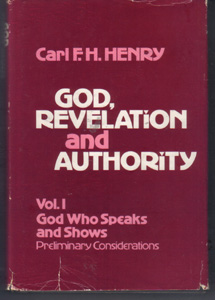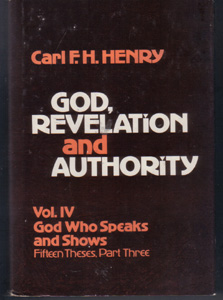GOD,
REVELATION
and
AUTHORITY Vol. IV
God Who Speaks
and Shows
Fifteen Theses, Part Three Hardback book with Dust Jacket by Carl F. H. Henry Over 670 pages First Printing, July 1979 Second Printing, April 1980 Copyright © 1979 by Word Incorporated " In Volume IV of God, Revelation and Authority, Carl F.H. Henry covers the last five of his fifteen theses on revelation, beginning with the concept of authority and the Bible as the authoritative norm. Because secular man has rejected the divine authority of the God of the Bible, he has also blurred a sense of human dependence on anything outside himself; "he himself must originate and fashion whatever values there are."
So, says Dr. Henry, "the current clash over the Bible's divine authority is a far-reaching controversy over the real nature of man and his destiny," a revolt which the Bible itself acknowledges and deals with. The Bible sets forth the divine authority of the message of the prophets and apostles recorded in its pages. Dr. Henry deals with the vast array of modern reductions of biblical authority, including those of James Barr, C.H. Dodd, Paul Tillich, Schubert Ogden, and others, as well as evangelical views which he feels do less than justice to the biblical teaching.
He treats the relationship between divine authority and scriptural authority, and discusses how the Bible may be considered literally true. There is only one kind of truth, he says. Religious truth is as much truth as any other. Because we are made in the image of God, we can comprehend the content of God's logically ordered revelation, that is, God's intelligible disclosure in rational concepts. The Bible gives us factual information about God, although it does not give us exhaustive knowledge of God. Under Thesis 12, Dr. Henry discusses the meaning of inspiration, inerrancy, infallibility, and illumination.
The inspiration of the Holy Spirit upon the prophets and apostles guaranteed the inerrancy of their message as recorded in the original manuscripts. The copies which we have are infallible, but not inerrant. Infallibility belongs to Scripture in our available versions and not to any ecclesiastical hierarchy. He then looks at some of the problem passages brought up to disprove the inerrancy of Scripture. Other chapters discuss the church's views on inerrancy through its history, the values as well as the abuses of historical biblical criticism, and the Bible's unity of thought and purpose. Theses 13 and 14 deal with the results of the church's proclamation of the gospel under the direction of the Spirit in the lives of individuals and in society. Here Dr. Henry looks at the regenerate church as the new society, and calls for Christian involvement in social issues, and the battle for social justice. Two chapters deal with the Marxist alternative to this call and the Marxist interpretation of Scripture. In the final chapter, Thesis 15, Dr. Henry treats the biblical doctrine of the end time, when "God will unveil his glory in a crowning revelation of power and judgment, vindicating righteousness and justice and subduing and subordinating evil." " Contents includes: " Thesis Eleven: The Bible as the Authoritative Norm 1. The Modern Revolt against Authority 2. Divine Authority and the Prophetic-Apostolic Word 3. Modern Reductions of Biblical Authority 4. Divine Authority and Scriptural Authority 5. Is the Bible Literally True ? Thesis Twelve: The Spirit as Communicator and Interpreter 6. The Meaning of Inspiration 7. The Inerrancy of Scripture
Supplementary Note: Barth on Scriptural Errancy 8. The Meaning of Inerrancy
Supplementary Note: The Chicago Statement on Biblical Inerrancy 9. The Infallibility of the Copies 10. The Meaning of Infallibility 11. The Spirit and the Scriptures 12. The Spirit as Divine Illuminator
Supplementary Note: Calvin on the Spirit's Work of Illumination 13. Are We Doomed to Hermeneutical Nihilism ? 14. The Fallibility of the Exegete 15. Perspective on Problem Passages 16. The Historic Church and Inerrancy 17. The Uses and Abuses of Historical Criticism 18. The Debate over the Canon 19. The Lost Unity of the Bible
Supplementary Note: Scripture as Functional Authority 20. The Spirit and Church Proclamation Thesis Thirteen: The Spirit, the Bestower of New Life 21. God's Graven Image: Redeemed Mankind 22. The New Man and the New Society Thesis Fourteen: The Church as the New Society 23. Good News for the Oppressed 24. Marxist Exegesis of the Bible 25. The Marxist Reconstruction of Man Thesis Fifteen: God and the End of All Ends 26. The Awesome Silences of Eternity " | 





 for 1 item(s)
for 1 item(s)

















